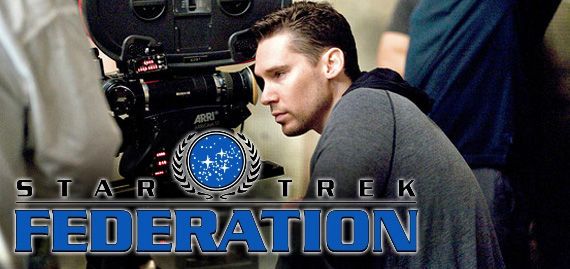Details on Bryan Singer’s Abandoned ‘Star Trek: Federation’ TV Show

Hollywood is filled with fascinating “What if…” tales regarding films & television shows that (for better or worse) never came to fruition. Sometimes it’s the simple notion of a different lead actor or director being attached to the production before dropping out. Other times, these stories involve a surprisingly unique approach to a beloved property – one that would have steered the franchise in question down a completely different road.
Last year, we learned a little bit about the Superman Returns sequel Bryan Singer was developing before Warner Bros. decided to reboot the series with Zack Snyder’s Man of Steel. As it turns out, Singer was also involved with another high profile project that ultimately never came together – a new Star Trek TV series set several centuries after The Next Generation.
Earlier this month, Jonathan Frakes (Commander Riker) revealed to UGO that he had pitched a Star Trek show to Paramount that would have centered around Riker’s exploits on board the USS Titan. The studio told him that they were putting the franchise on the back burner for a little while – and that they had also recently rejected pitches from William Shatner and Singer.
The speculation over what Singer’s proposed series might have been about prompted TrekMovie to shed some light on what actually transpired between the acclaimed filmmaker and Paramount. It began in December of 2005 when Singer, screenwriter Christopher McQuarrie (The Usual Suspects, The Wolverine), and director Robert Meyer Burnett (Free Enterprise) met for dinner and started toying around with the idea of pitching a new Star Trek TV show.
By the time their dinner was over, it had been decided that Burnett would draft a series proposal that the team would take to Paramount once Singer was finished with post-production on Superman Returns. Burnett enlisted writer Geoffrey Thorne (Leverage) to help him put together a 25-page long proposal that outlined their approach to the material, the show’s main characters, and the story arc for the first four episodes. They titled their series Star Trek: Federation.
Paramount never rejected their pitch, however – because it was never made. Before Singer and Co. could present Federation to the studio, it was announced that J.J. Abrams had been hired to direct a new Star Trek movie. Realizing that an updated grand design for the franchise had already been constructed, the team abandoned their project.

Regardless, it’s always fun to take a look at what might have been and TrekMovie has some interesting excerpts from Burnett & Thorne’s proposal. The main difference between their series and Abrams’ Trek is that Federation would have taken place in the original timeline. Still, they recognized that the Star Trek brand needed to be revitalized and their proposal began with an explanation of how they hoped to accomplish that:
The great strength of STAR TREK is the very Universe in which it’s set. The Characters. The Starships. The Aliens. The stories. Gene Roddenberry himself provided the perfect example how to create a wildly successfully new STAR TREK series…
Acknowledge what’s come before, but then set your stage far enough in the STAR TREK future when everything old is new again.Turn the STAR TREK Universe upside down. Shake vigorously.
Utopia as a goal is like the fire in a nuclear engine. Utopia in practice is stagnation; it’s dry rot; eventually it’s death. Which is precisely where we find the United Federation of Planets a few centuries after the last Age of Discovery.
Basically, this would have been a darker and more dangerous time for the Federation and the idea was that its decay could be used as an allegory for the Fall of the Roman Empire. According to the proposal, “Starfleet has been reduced to a ‘mere peace-keeping force’ protecting fringe worlds from aliens and from fighting each other, with starships that are old and spread out too thin.”
The appearance of a powerful new enemy knows as “The Scourge” would have lead to the creation of another USS Enterprise – the first in over 300 years. On the surface, the Enterprise’s mission would have been one of exploration – but her real mission would have been to investigate The Scourge in order to save what was left of the Federation.

1
2
About The Author

















